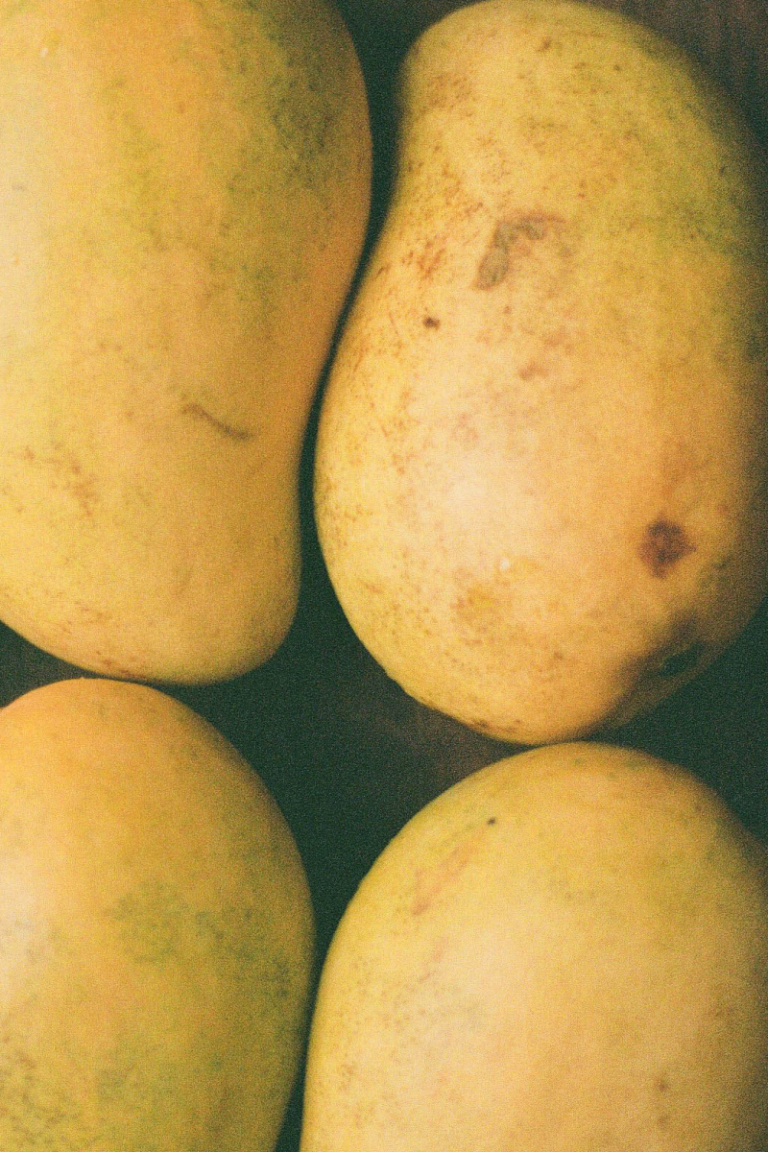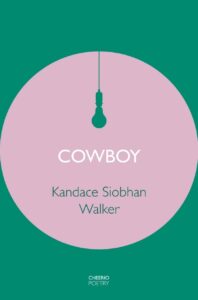Kandace Siobhan Walker
Three Mangoes, £1
To be alive is to be in conversation with the dead. The ghosts of loved ones are always swirling around us, and sometimes we’re lucky enough to catch a glimpse. In the poem “Three Mangoes, £1,” Kandace Siobhan Walker describes a surprising encounter with her late grandmother at a busy market, and an encounter with a stranger.
We’re pleased to offer Kandace Siobhan Walker’s poem, and invite you to read Pádraig’s weekly Poetry Unbound Substack, read the Poetry Unbound book, or listen back to all our episodes.

Image by Annisa Hale/ Film processed by Moody's Film Lab, © All Rights Reserved.
Guest

Kandace Siobhan Walker is a writer and artist of Jamaican-Canadian, Saltwater Geechee, and Welsh heritage. Her poems have appeared in Magma, The White Review, Poetry Wales, and a number of anthologies. She is the author of the pamphlet Kaleido (Bad Betty, 2022). In 2021, she was both the recipient of an Eric Gregory Award and the winner of the White Review Poet’s Prize. In 2019, she won the Guardian 4th Estate BAME short story prize. Cowboy, her debut full-length collection from CHEERIO Publishing, is shortlisted for the Forward Prize for Best First Collection in 2023.
Transcript
Transcription by Alletta Cooper
Pádraig Ó Tuama: My name is Pádraig Ó Tuama and over the years when friends have died, or relatives have died, I’ve gotten used to the fact that shortly after they’ll die, something will happen where I have a dream about them, or I see somebody that looks just like them. And, of course, it’s just an association in the mind. But I welcome those times.
During COVID a very close friend died and he didn’t show up in my dreams, and I couldn’t see him around the place because I wasn’t out on the street to be able to see someone that looked like him and feel like there was some kind of visitation. So I made it up. I made up a story for what it would be like to see him so that I could have that final conversation.
[music: “Praise the Rain” by Gautam Srikishan]
“Three Mangoes, £1” by Kandace Siobhan Walker
“You know the dead are never dead / because I saw my
mum’s mum / walking down Lewisham High Street / she
was wearing purple / she’s always wearing purple / tak-
ing bites out of unripe mangoes / replacing them with the
other fruit / either she was invisible to the market ven-
dor / or unimaginable / the same thing really / our dead
couldn’t stay dead even if they wanted to / what we call a
legacy / her voice / when she spoke / sounded tinny with
a hair-raising intimacy // we met last in a Toronto suburb
/ I remember / nothing about her / except pearls, deep
violet dress / full wig of violent / shine curls / her home
smelled like clean magic / fans running in every room /
but she wouldn’t open the windows / afraid we’d let the
dead back / in / as if they hadn’t made it through cus-
toms in our suitcases / her figure wavered / a telephone
line with a fault / her death too was technical / speaking
nothing of the bloated cancers / marbled purple calves /
decaying waterlogged feet / an email / with her name in
the subject line // just the Barbadian man from Waltham-
stow recognised iron in the air / her smell / like an an-
imal wound / he looked up, put a mango in a wrinkled
blue bag / his smile was not without empathy // for free
/ he said / there’s no way to bury these things / earth will
only spit it back out / he must’ve known / he said eat /
in the park / it’s a day / neither fine nor good / just a day”
[music: “Ashed to Air” by Gautam Srikishan]
This poem, “Three Mangoes, £1”, and it’s £1 in terms of sterling money used in Britain. This poem has so many settings: Lewisham High Street in London, there’s a market, there’s a Toronto suburb, there’s the home of the mother’s mother, the grandmother, and there’s the man in Walthamstow, a place in England, from Barbados.
The reference to customs and suitcases and different places brings in mind the bio of Kandace Siobhan Walker. She is a writer and artist of Jamaican, and Canadian, and Saltwater Geechee, and Welsh heritage. And so in the story of her own life, and in the story of this poem, there is multiplicity of place and then, there’s the presence of the living and the dead in all those places and also are manifested in her own body.
Location is used in order to try to locate the things that span borders, that don’t have any recognition of customs, that don’t have any recognition of time, that follow with you in and out of your experience: the dead, your memory of the dead, the way it’s suggested in smell, and the way that they come in, perhaps uninvited and unbidden, and maybe that’s pleasant or maybe that’s a shock, we don’t know. So, the locatedness of the poem is also pointing to the way that some things traverse borders over and over and over.
And the generosity of the poem is held so powerfully in that Barbadian man from Walthamstow who “smells iron in the air” and it seems to me that he must recognize that the person in front of him is in grief. And he makes that gift of “a mango in a wrinkled / blue bag” with that smile that isn’t without empathy. I love the way that she states that as some kind of negation of a negation. And then he says, “eat.” Or maybe he says, “eat in the park.” I don’t know. The poem doesn’t tell you exactly when his spoken word ends. Anyway, she goes to the park and it’s just an ordinary day. “Neither fine nor good / just a day.”
[music: “A Pleasant Strike” by Blue Dot Sessions]
There’s a turn in the middle of the poem when Kandace Siobhan Walker brings us into a memory. “we met last in a Toronto suburb / I remember / nothing about her.” It’s so interesting the way that she says “I remember nothing / about her” and then with the “except,” there’s loads of things she remembers about her: “Pearls,” the “violet dress,” the “full wig of violent / shine curls.” The body occurs particularly in all kinds of ways throughout this section of the poem. The hair, the wig, her own body, too, smelling “like clean magic” the home smells like. And perhaps the way that you feel a fan on your skin.
The grandmother’s figure is referred to: “her figure waivered.” And then her death. You know, death occurs in the body and then we hear of “bloated cancers” and “marbled purple calves” and “decaying waterlogged feet.” These are such difficult things to remember. She is a person filled with life and character at the start of the poem. “She was wearing purple / she’s always wearing purple / taking bites out of unripe mangoes / replacing them with the other fruit.”
Mangoes don’t grow in Britain, or at least good ones don’t grow in Britain. So it feels like there’s a comment being made about mangoes that have traveled the world and somebody who knows what a mango should taste like is tasting it, and going, “Nah, I’m putting that one back. I’m going to get something else instead.” I love the playfulness and audacity and permission-giving of this character.
And then for her to be referred to through “bloated cancers” and calves and feet. And then the next line takes it even further, “an email / with her name in the subject line.” Was that the way that she got some news? Or was that the way that the most recent time that she was referred to in writing? Something abstract, something electronic, something that has moved away entirely from the body.
And then we go into the section in the market with the Barbadian man from Walthamstow. And suddenly she has gone beyond body. She’s gone into the ether, to the atmosphere, to the smell, to the intuition between one person and another who gives a gift in this blue bag and she takes it to a particular place, a park, a place where you can see widely. Hopefully, a park is a place where there aren’t borders. Hopefully, a park is a place where there’s calm and ease, even on an ordinary day.
[music: “Creatures of Myth” by Gautam Srikishan]
It’s interesting that she says “mum’s mum” rather than grandmother. Partly, I think, it’s for the purpose of the technicalities of the poem, which is so held together with alliteration and so held together with forms of rhyme as well as forms of association. “The dead are never dead.” D and D there. And then there’s three M’s: “because I saw / my mum’s mum.” There’s then “invisible” or “unimaginable” are contrasted against each other. And I think those associations are so interesting. “Our dead / couldn’t stay dead.” “Tinny with a / hair-raising intimacy.” “Telephone” and “fault” and “death too technical.” Even in the difficulty of saying “marbled purple calves.” And finally, towards the end, there’s “blue bag.”
I think one of the uses that Kandace Siobhan Walker is making of the technicalities of alliteration in this poem is not just for the demonstration of technicality — she’s a brilliant writer — but she is using alliteration to demonstrate a deep intuition, which is that sound can echo sound, that sound itself can follow you around like a ghost. And there are ghost sounds in this poem in the way that certain sounds are repeated in full rhyme, half rhyme, in full alliteration, inferred alliteration, in things that are associated with each other, “invisible,” “unimaginable.” And all of that comes back to the question about what we call a legacy, her voice, when she spoke.
[music: “The Edge of All There Is” by Gautam Srikishan]
Kandace Siobhan Walker has made this poem be a meditation on death and the strangeness of it. In the poem, it’s like she sees somebody walking down the street and thinks, “Oh my God, that’s her. That’s my mum’s mum.” And then she says, “either she was invisible to the market ven- / dors / or unimaginable,” which is a way of saying that the dead are with you and that life itself can be filled with the memories of the dead who are near us. And we think of legacy and even “hair-raising intimacy” as bringing back a certain sense of horror thinking of how strange it can be to be frightened as well as enamored with the experience of someone you love or someone you’re close to when you, you feel like you’re being visited by them.
And the memory that she — the grandmother — too had been “afraid we’d let the / dead back / in,” hence she wouldn’t open the window. The poem towards the end speaks about death and says, “There’s no way to bury these things/ earth will / only spit it back out.” What does that say that maybe you can’t bury them in yourself either, that yourself — the earth of your body — will spit memory back out, will spit the part of you that’s still in conversation with the person who’s been in your life back out, that it’ll keep on coming through senses, through what’s around you, through the seeming mistakes that you make when you see someone in the street and suddenly you’re reminded of the person who has died, you’re in conversation with them. And what I love about the setting of this poem is that it isn’t just that this is a single private experience. Somebody else recognizes and makes a gift within it, which is to say what you’re experiencing in this strange presence of the one who isn’t here — what you’re experiencing is true. And here’s a gift to help you.
[music: “Family Tree” by Gautam Srikishan]
“Three Mangoes, £1” by Kandace Siobhan Walker
“You know the dead are never dead / because I saw my
mum’s mum / walking down Lewisham High Street / she
was wearing purple / she’s always wearing purple / tak-
ing bites out of unripe mangoes / replacing them with the
other fruit / either she was invisible to the market ven-
dor / or unimaginable / the same thing really / our dead
couldn’t stay dead even if they wanted to / what we call a
legacy / her voice / when she spoke / sounded tinny with
a hair-raising intimacy // we met last in a Toronto suburb
/ I remember / nothing about her / except pearls, deep
violet dress / full wig of violent / shine curls / her home
smelled like clean magic / fans running in every room /
but she wouldn’t open the windows / afraid we’d let the
dead back / in / as if they hadn’t made it through cus-
toms in our suitcases / her figure wavered / a telephone
line with a fault / her death too was technical / speaking
nothing of the bloated cancers / marbled purple calves /
decaying waterlogged feet / an email / with her name in
the subject line // just the Barbadian man from Waltham-
stow recognised iron in the air / her smell / like an an-
imal wound / he looked up, put a mango in a wrinkled
blue bag / his smile was not without empathy // for free
/ he said / there’s no way to bury these things / earth will
only spit it back out / he must’ve known / he said eat /
in the park / it’s a day / neither fine nor good / just a day”
[music: “Praise the Rain” by Gautam Srikishan]
Chris Heagle: “Three Mangoes, £1” comes from Kandace Sioban Walker’s book Cowboy. Thank you to Cheerio Publishing who gave us permission to use Kandace’s poem. Read it on our website at onbeing.org.
[music: “Praise the Rain” by Gautam Srikishan]
Poetry Unbound is: Gautam Srikishan, Eddie Gonzalez, Lilian Vo, Lucas Johnson, Amy Chatelaine, Kayla Edwards, Annisa Hale, and me, Chris Heagle.
Our music is composed and provided by Gautam Srikishan and Blue Dot Sessions.
This podcast is produced by On Being Studios, which is located on Dakota land. Open your world to poetry with us by subscribing to our Substack newsletter. You may also enjoy Pádraig’s book, Poetry Unbound: Fifty Poems to Open Your World. For links and to find out more visit poetryunbound.org.
Books & Music
Recommended Reading
The On Being Project is an affiliate partner of Bookshop.org and Amazon.com. Any earnings we receive through these affiliate partnerships go into directly supporting The On Being Project.








